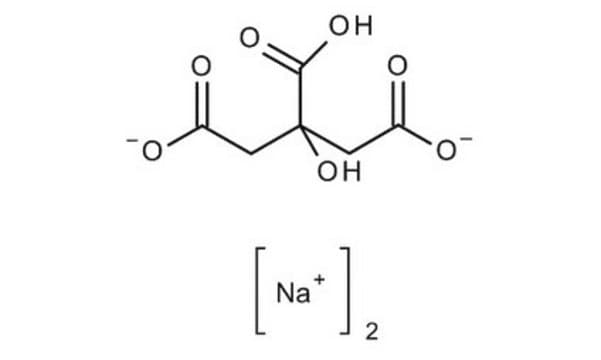359084
Sodium hydrogencitrate sesquihydrate
ReagentPlus®, 99%
Synonym(s):
Citric acid disodium salt, Citric acid disodium salt sesquihydrate, Di-Sodium hydrogen citrate sesquihydrate, Disodium hydrogen citrate sesquihydrate, Sodium citrate dibasic sesquihydrate
About This Item
Recommended Products
product line
ReagentPlus®
Assay
99%
form
solid
mp
149 °C (dec.) (lit.)
SMILES string
O.O.O.[Na+].[Na+].[Na+].[Na+].OC(=O)C(O)(CC([O-])=O)CC([O-])=O.OC(=O)C(O)(CC([O-])=O)CC([O-])=O
InChI
1S/2C6H8O7.4Na.3H2O/c2*7-3(8)1-6(13,5(11)12)2-4(9)10;;;;;;;/h2*13H,1-2H2,(H,7,8)(H,9,10)(H,11,12);;;;;3*1H2/q;;4*+1;;;/p-4
InChI key
HGPVLOQNBSHYEI-UHFFFAOYSA-J
Related Categories
Application
Legal Information
Storage Class Code
13 - Non Combustible Solids
WGK
WGK 1
Flash Point(F)
Not applicable
Flash Point(C)
Not applicable
Personal Protective Equipment
Certificates of Analysis (COA)
Search for Certificates of Analysis (COA) by entering the products Lot/Batch Number. Lot and Batch Numbers can be found on a product’s label following the words ‘Lot’ or ‘Batch’.
Already Own This Product?
Find documentation for the products that you have recently purchased in the Document Library.
Customers Also Viewed
Our team of scientists has experience in all areas of research including Life Science, Material Science, Chemical Synthesis, Chromatography, Analytical and many others.
Contact Technical Service










